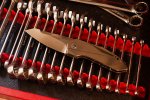soc_monki
Gold Member
- Joined
- Apr 5, 2019
- Messages
- 1,889
Side note...
Current Snap On is crap, there warranty is worse than harbor freight. Same with Klein Tools! I no longer buy anything from a a tool truck, all online german tools wiha and wera.
When I first got into the electrical trade everyone told me to get Klein tools. That's the electricians tools! I got a pair of Klein linemans pliers, the heavy duty ones rated to cut acsr. Not three years later and they were worn out. Cutting Jaws scissored, rivet so loose you'd think they were going to come apart. Traded them in under warranty, but have no idea what I did with that pair...
Now I use Knipex. Still perfect after 3 years. Also have their cobra and alligator pliers, wire shears, pliers wrench... Yup, screw Klein. They were top dog at one time, but quality has taken a nosedive. I know people with 30 year old kleins that are still great, but new ones wear out so fast they're not even worth it, even with the warranty. Most people I know buy new tools every year or so anyway, or at least used to when you could claim them on your taxes...
I have a few Klein tools still, but no screwdrivers (junk).
I think my wrenches are Husky though, or Pittsburgh... Cheap wrenches and sockets are fine. I want the good stuff when it comes to my pliers though.

